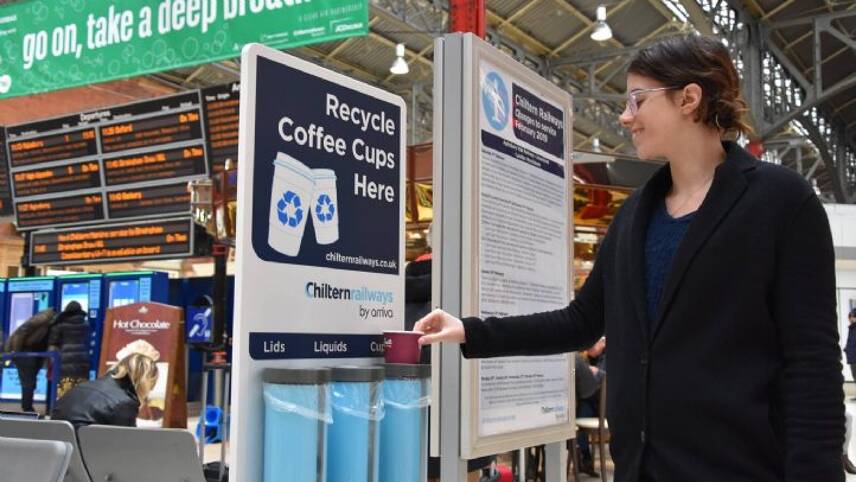Register for free and continue reading
Join our growing army of changemakers and get unlimited access to our premium content

The 10 bins at Marylebone Station are anticipated to collect 300
Under the scheme, bespoke bins which encourage users to separate their coffee cups, cup lids and liquid waste have been installed at all of Chiltern Railways’ managed stations, with the most recent installation of ten bins having taken place at London’s Marylebone Station this week.
Cups and lids deposited in the bins will be taken by Simply Cups to UK-based recycling facilities, where they will be processed and turned into new products, including stationary and reusable coffee cups. Such products will be sold by Chiltern Railways, which will incorporate them into its branded merchandise range.
The decision to roll-out the scheme was taken after a two-week trial at one of Chiltern Railways’ 32 managed stations last month proved successful.
The train operator estimates that around 300,000 coffee cups will be collected and recycled from Marylebone Station alone within the next 12 months, and is now encouraging other transport firms to set up similar schemes and extend the sector’s overall impact on coffee cup waste.
“With the knowledge that more than five billion paper cups are making their way into landfills and incineration each year, we feel it is our duty to set a standard of excellence for the rail industry and provide our customers a guaranteed way of recycling their used cups,” Chiltern Railways’ customer services director Alan Riley said.
“While we’re proud to be championing this scheme on behalf of our customers, the hope is that this is quickly adopted across other parts of the rail network”
Simply Cups’ co-founder Peter Goodwin added that the scheme would help to avoid “customer confusion” over cup recycling and prevent the contamination of waste streams.
The coffee cup conundrum
The move from Chiltern Railways comes at a time when just one in every 400 coffee cups distributed within the UK is collected for recycling, with more than 500,000 cups littered every day, according to the Environmental Audit Committee (EAC).
EAC chair Mary Creagh has argued that this trend is largely due to a lack of publicly available recycling bins for the coffee cups and the absence of a ‘latte levy’ charge on takeaway drinks, compounded by the fact that the cups can only be recycled in select infrastructure.
Takeaway coffee cups are commonly sealed with a plastic lining to make them waterproof. Although both materials are recyclable, the lining cannot be handled by most recycling facilities, while the paper is subjected to contamination issues.
In response to the issue, several of the UK’s largest waste management firms, including Scotwaste and Forge, have invested in specialised recycling in recent years. And in the corporate space, the likes of Costa, McDonald’s and Starbucks have all launched recycling schemes to collect cup waste and send it to such facilities.
Such initiatives are also increasingly being taken up by estate and facilities management firms, transport companies and higher education providers, in a bid to drive consumer behaviour change during “on-the-go” scenarios.
Heathrow Airport has pledged to recycle the equivalent of the 13.5 million cups used on its estate annually, for example, while London City Corporation and Media City UK are among the British businesses to have launched a Simply Cups scheme since 2014.
Businesses are additionally making moves to incentivise reuse in a bid to minimise their coffee cup outputs. Costa offers customers who bring reusable cups a 25p discount on their drinks – a similar incentive to those offered by Pret A Manger, Caffe Nero and Greggs. Competitor Starbucks, meanwhile, recently moved to add a 5p charge to its paper cups in addition to its 25p discount for reusable cup users – a decision which saw reusable cup use increase 156% in just six weeks.
Sarah George


Please login or Register to leave a comment.